After nearly five years of legal battles, Bollywood actor and newly elected MP Kangana Ranaut has officially resolved her defamation dispute with veteran lyricist Javed Akhtar. In a settlement reached before a special court in Mumbai, Ranaut issued an unconditional apology for her past remarks, bringing an end to a case that had been dragging on since 2020.
The conflict began in July 2020, when Kangana, in a media interview following the death of actor Sushant Singh Rajput, mentioned Javed Akhtar’s name while discussing the alleged power struggles within Bollywood. Akhtar took offence and filed a defamation case, stating that her statements had damaged his reputation. A year later, Kangana countered with a complaint of her own, accusing Akhtar of intimidation and undue pressure regarding a separate controversy involving actor Hrithik Roshan.
On Friday, both parties appeared before the Bandra magistrate court, where they formally withdrew their complaints. The case was resolved through mediation, that allowed them to reach a mutual understanding without further litigation. The court, which handles cases involving public figures, accepted their statements and officially closed the matter.
In her apology, Ranaut acknowledged that her remarks from the 2020 interview stemmed from a misunderstanding. She withdrew her previous allegations, assuring that she would not repeat them in the future. “I deeply regret any inconvenience caused to Mr. Javed Akhtar. I respect him as a senior member of the film industry and withdraw my statements unconditionally,” she stated in court.

Akhtar’s lawyer, Jay Kumar Bhardwaj, confirmed that the 80-year-old lyricist accepted Ranaut’s apology and agreed to drop his defamation complaint. The court recorded the settlement and acquitted both parties based on the mediator’s report.
This case had drawn significant public and media attention, given the stature of both individuals involved. With the dispute now officially settled, Ranaut and Akhtar can move forward without the shadow of legal proceedings looming over them.





